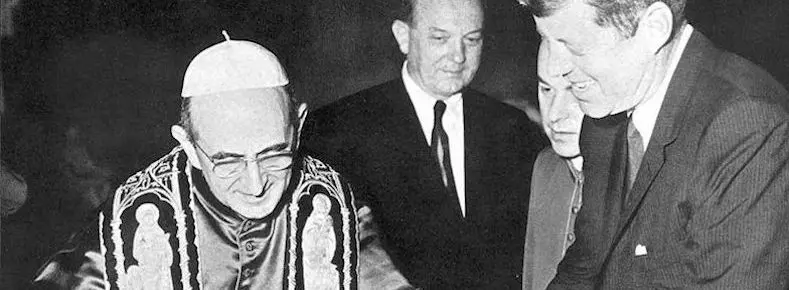Previous articles in this series:
- Part I: Introduction to Humanae Vitae
- Part II: The Predictions of Humanae Vitae
- Part III: The First Prophecy
- Part IV: The Second Prophecy
- Part V: The Third Prophecy
- Part VI: The Fourth Prophecy
- Part VII: Modernity’s Challenges to Humanae Vitae
- Part VIII: The Church’s Right to Teach on Birth Control
- Part IX: The Church’s Teaching Authority
Later articles in this series:
- Part XI: The Moral Norm of Humanae Vitae
- Part XII: Doctrinal Objections to Humanae Vitae
- Part XIII: Pastoral Guidelines
In our previous article we treated of the teaching authority of the encyclical Humanae Vitae. We concluded that its teaching against contraception was infallible because the ordinary magisterium of bishops and popes requires an assent of faith from the faithful. We also saw that even if the content of Humanae Vitae were not infallible, that is to say, a definite part of God’s revelation, it would at least qualify as a serious teaching that leads to a better understanding of God’s revelation and thus requires religious assent. In other words, dissent against this teaching should be absolutely prohibited.
In this article we approach the main doctrinal principles St. Paul VI teaches in Humanae Vitae as the foundation for the Church’s rejection of contraception and Her promotion of conjugal love and the transmission of human life. Those principles are:
- A whole vision of the human person
- Conjugal love
- Responsible parenthood
A Whole Vision of the Human Person
Humanae Vitae affirms that in order for the Church to teach about the transmission of human life, it is first necessary to establish its foundation in a vision of the whole human person. The encyclical clearly shows what this vision is and why it is necessary:
The question of human procreation, like every other question which touches human life, involves more than the limited aspects specific to such disciplines as biology, psychology, demography or sociology. It is the whole man and the whole mission to which he is called that must be considered: both its natural, earthly aspects and its supernatural, eternal aspects. (no. 7)
The human person is not reducible to his body; he has a spiritual dimension we call “soul.” The human person is a substantial composite of body and soul, meaning that the unity between body and soul is not accidental but of such a depth that the resulting being is a unique and unrepeatable human person. This unity began at the precise moment in which God infused a soul into the body of the new human person at the his conception. This implies that the whole human body is completely vivified and informed by the human soul. (“Inform” here means that the soul renders the body into what it is: the body of a human person.)

From the Creation and Fall of Man by Albertinelli Mariotto (PD-1996)
The human soul is endowed with an intellect and a free will, which act and express themselves through the human body. This truth implies that the human person is a relational being with an intrinsic and absolute worth we call dignity. The human person possesses this dignity in his very being. Therefore, every human person is dignified in virtue of the simple fact that he or she is a person, and not by any other characteristic or circumstances: race, ethnicity, place of residence, economic or social status, and so on.
This dignity comes from his spiritual dimension, the soul, which is immortal and so of infinite value. And since the body is intrinsic to the person, it also shares in the dignity of the soul. In fact, Christians believe in the resurrection of the body, of which the model is Christ’s glorified Body. The dignity of the human person is also taught by Revelation: we have been created in God’s image and destined for eternal life.
Since the body of the human person is substantially (not accidentally) united to its soul, it follows that the human body is an intrinsic dimension of the person. It also follows that the body expresses the soul, expresses the person; it tells us what the human being is: male or female and only male or female, since in human nature, as created by God, we only find male and female bodies.
Thus God has designed the body of the human person as male or female. Man and woman possess the same dignity, but are different, complementary, and capable of responsibly transmitting human life within the context of marriage. Marriage is a covenant of life and love between a man and a woman that is intended to be for life and open to life. The family, founded on marriage, is the principal cell of society.
Conjugal Love
Humanae Vitae is much more than a rejection of contraception. It contains a beautiful teaching about conjugal love and its openness to life. In HV 8 and 9, St. Paul VI describes conjugal love by means of its four main characteristics.
But he preambles the description of each of those characteristics by affirming that marriage and conjugal love are the result of God’s loving and wise design, part of God’s plan for humanity. They play an essential role in God’s plan of salvation in human history. These characteristics are not the product of evolution or blind natural forces. They are anterior to the state and to society. Since they were instituted by God Himself when He created man and woman (see Genesis 2:24), no human authority has the right to redefine them or to invent other “unions” that could distort the meaning of the original unity between one man and one woman in marriage.
- Marriage is fully human. It includes both the physical and the spiritual dimensions of the spouses. The union of man and woman in the conjugal act is not only a union of their bodies but also of their souls, as the spouses give themselves to each other completely. Furthermore, this love is an act of the free will and not only the result of feelings, important though feelings are. By being anchored in the intellect and the will, the two most important and distinctive spiritual faculties of the human person, true conjugal love is not subject to the highs and lows of passing human emotions but retains its constancy despite the problems and challenges of life.
- Marriage is total. The spouses mutually give and receive themselves totally as they are, including their fertility, and without reservation or selfish calculations. They give and receive each other as gifts from God. They love each other by enriching each other with the gift of themselves. They treat each other as ends in themselves, as persons, and not as means for selfish pleasure.
- Marriage is faithful and exclusive unto death. Faithfulness is an intrinsic characteristic of true love. In the case of conjugal love, exclusivity is also intrinsic, even essential. True marriage is one and indissoluble, faithful till death. A love that is not life-giving and for life is no love at all. Faithfulness is not always easy in a permissive society such as ours. But the loving effort employed to reject any temptation (even of the heart only) builds up the marriage covenant even more and strengthens love.
- Marriage is fruitful. True conjugal love transcends itself and prolongs itself by cooperating with God in the creation of new human beings. A conjugal love that deliberately shuts itself to new life is no true love at all: there cannot be a lifeless love. Even in the spiritual order, love is fecund—when Christ unites with His Bride, the Church, they engender new sons and daughters of God by means of Holy Baptism (see Ephesians 5:25-27). Those called to virginity or celibacy for the Kingdom of God are called to be spiritually fruitful by means of the sacraments and other activities, such as evangelization, pastoral care, and witness to Christ. Even married couples who through no fault of their own cannot beget children can be spiritually fruitful in the Church and in the world. The spouses whom God has blessed with His most excellent gift of children are called to spiritually “beget” their sons and daughters by instructing them with the teachings of the Church. The Church teaches that the gift of procreation does not limit itself to the begetting children but extends to their care and education. In fact, parents are the first and foremost educators of their children.
Responsible Parenthood
Because of the widespread use of contraception, sterilization, and abortion, there is a lot of confusion today as to what constitutes true responsible parenthood. Many people and anti-life organizations, such as Planned Parenthood, falsely believe that responsible parenthood means using contraceptives, sterilization, or abortion to avoid the cruelly so-called “unwanted children”, even if the sexual partners involved are unmarried teenagers.
This is why Paul VI gives a precise definition of true responsible parenthood in Humanae Vitae 10. We can summarize this concept of responsible parenthood in the following two points:
- Spouses are called to have a generous attitude towards the transmission of life. Our modern culture wrongly believes that we are “overpopulated” or that the human race is “too large to avoid a catastrophic climate change,” and so families ought to have no more than two children. There are even governments, like that of communist China, that have imposed restrictive procreation quotas on married couples. These horrible policies have resulted in millions and millions of forced abortions and sterilizations. Such a selfish aversion to procreation is totally contrary to the original commandment of God, “Be fruitful and multiply and fill the earth” (Genesis 1:28).
- Nevertheless, the Church does not teach that married couples ought to have as many children as they physically can. Rather, according to the Church, married couples ought to have as many children as they can responsibly have. But the Church’s concept of responsibility here is totally different from that of modern society. It starts, as we said above, with a generous openness to life. If this is not possible because of serious physical, economic, psychological or social reasons – not because of selfish reasons – then married couples may make use of natural methods of fertility awareness, and only those, to space apart their pregnancies.
These doctrinal principles pave the way for Humanae Vitae’s condemnation of contraception as an intrinsically and gravely evil act. We shall discuss this subject in our next article.
Previous articles in this series:
- Part I: Introduction to Humanae Vitae
- Part II: The Predictions of Humanae Vitae
- Part III: The First Prophecy
- Part IV: The Second Prophecy
- Part V: The Third Prophecy
- Part VI: The Fourth Prophecy
- Part VII: Modernity’s Challenges to Humanae Vitae
- Part VIII: The Church’s Right to Teach on Birth Control
- Part IX: The Church’s Teaching Authority
Later articles in this series:
- Part XI: The Moral Norm of Humanae Vitae
- Part XII: Doctrinal Objections to Humanae Vitae
- Part XIII: Pastoral Guidelines
Related Content
Adolfo is the Director of Education for Hispanic Outreach for Human Life International and of HLI's Hispanic outreach arm Vida Humana Internacional. He has a Masters in Theology from St. Vincent de Paul Regional (Major) Seminary and a License in Moral Theology from the Alphonsian Academy in Rome.
Adolfo has traveled frequently to VHI’s affiliates in Latin America to give talks, training sessions, and media interviews. He has authored and co-authored books, articles, reports, and a pro-life training course for Hispanics in the U.S. Adolfo has also participated in the production of two TV pro-life series in Spanish, which have been aired through EWTN en Español.















